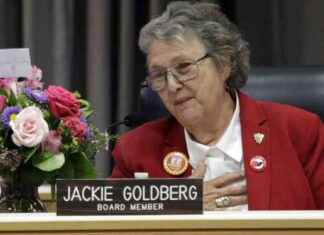“They dared to do it in Paris! » These words, still marked with disbelief, are those of Jacqueline Dérens, French friend of the South African Dulcie September, assassinated on the morning of March 29, 1988, in front of her Paris office of the African National Congress, rue des Petites-Ecuries.
Who fired the five 22 caliber bullets with a silencer that destroyed the face of the 52-year-old anti-apartheid activist, Nelson Mandela’s official representative in France? Trying to resolve this still unsolved enigma means diving back into the history of the racist regime, but also unraveling the troubled links that France maintained with South Africa despite the sanctions imposed by the United Nations.
Because behind the official disapproval, business continues in secret: arms sales, military equipment, oil, nuclear power, surveillance technologies… It is “this double game”, in her words, that Dulcie September will discover in the last months of her life, during which she will investigate tirelessly, wanting to denounce the “too great silence on collaboration” between the two countries.
In three chilling episodes, Pauline Liétar asks the angry questions. Who ordered the assassination? Who executed it? Could Pretoria plan such a crime without the complicity of French networks? Why would François Mitterrand, who had offered asylum to Mandela’s emissary who was still imprisoned, let this happen? Why did Charles Pasqua, Minister of the Interior, not respond to Dulcie September’s request for protection? Why did the courts dismiss the case in 1992 without having explored the most serious trail which led to the mercenary Bob Denard? “All of this was not done correctly,” says the family’s lawyer, Yves Laurin, in the documentary.
Erased from collective memory
Valuable witnesses agree to appear on camera for the first time. Pauline Liétar brings together leading actors – diplomats, agents of the General Directorate of External Security, investigators – and unearths the damning testimony of the sordid head of the political police of the South African regime, Eugene de Kock, interviewed during the Truth and Reconciliation Commission in 1998.
Probing what has all the makings of a state affair also means discovering the considerable emotion that the death of the activist, now erased from collective memory, had aroused in France. It is seeing emerge from the archives these thousands of Parisians following the funeral procession to Père-Lachaise, listening to the public eulogy of Georges Marchais, general secretary of the French Communist Party, and this crowd of “Touche pas à mon pote” activists. demanding justice with cries of “Dulcie is our friend! »
Apartheid: a murder in Paris traces the singular journey of a rebellious mixed race, ready for the “supreme sacrifice”, say those close to her, for a just cause and who experienced prison, banishment, exile, and death, on the landing of a Parisian building, almost in silence.






